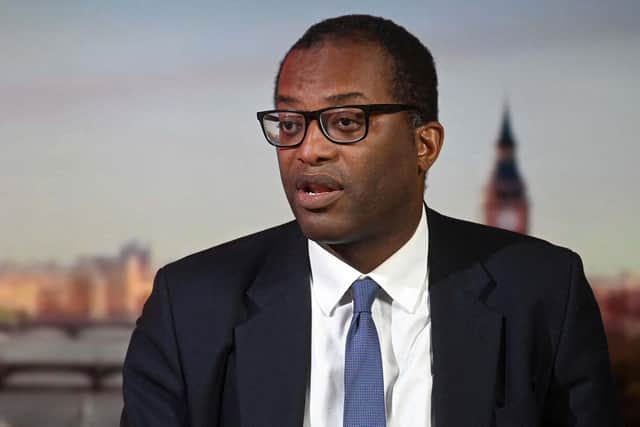Downing Street backs Kwasi Kwarteng over energy crisis Treasury row
A spat between UK Government departments began after the Business Secretary told broadcasters he was in talks with Rishi Sunak’s department to work out ways to support the industry.
His claims prompted a stunning rebuke from the Treasury, with a source at the department accusing Mr Kwarteng of “making things up in interviews”.
Advertisement
Hide AdAdvertisement
Hide AdBut now No 10 has insisted officials at the Treasury were involved in the cross-government work.


The prime minister’s official spokesperson said: “This is a significant challenge, and there’s work across government to mitigate it.
“As you would expect, ministers from BEIS (Department for Business, Energy and Industrial Strategy) are working across government, including with the Treasury on this important issue, the challenges that are currently facing industry in light of global gas prices and that will continue.”
Pushed on whether Boris Johnson had spoken with either Mr Sunak or Mr Kwarteng about their “extraordinary falling out”, they replied: “It’s not how I would characterise it according to an anonymous quote.”
Mr Johnson is currently on holiday in Andalucía at a property owned by the environment minister Zac Goldsmith, but his spokesman insisted he was “closely involved”.
The Prime Minister’s official spokesman said he did not want to “jump ahead” of energy discussions with businesses, but added: “I think what we’re saying is that we will continue to speak with industry.
“And obviously that work’s being led by Kwasi Kwarteng to discuss the impacts they’re seeing and we will consider whether any further action is necessary to mitigate the challenges.
“We recognise they are facing a particular challenge at this point and we’ll continue to discuss that with them.”
Advertisement
Hide AdAdvertisement
Hide AdThe Scotsman understands the Department for Business, Energy and Industrial Strategy have now submitted a formal appeal for support to the Treasury.A source at the BEIS labelled the Treasury response as "dreadful".
They added: "I get that they've got a difficult role with lots of spending demands but there was no need for a brutal slapdown."
On Monday morning Home Office Minister Damian Hinds also denied that Mr Kwarteng lied when he said there were discussions between Government departments about help for energy firms.
He explained: “These unnamed sources stories come out from time to time.
“The fact is Government departments, Government ministers talk to each other the whole time and of course with an issue like this, with these rising global prices and business having to grapple and deal with it to make sure they break even and can make a margin of course that is something that the Business Secretary – and of course the Energy Secretary – is going to be totally focused on.
“Something that the Treasury, of course, is also very focused on as the economic management department of the nation.”
Labour’s Shadow Chancellor Rachel Reeves has now written to the Chancellor and accused him of being "missing in action".
Calling for more support, she said: “The Government should be protecting and supporting them through a crisis which has come about from their own lack of planning.
Advertisement
Hide AdAdvertisement
Hide Ad“They have a duty to get an immediate grip on this situation, and businesses need reassurance that this is happening.”
Meanwhile, it emerged yesterday the Government has brokered a deal with the carbon dioxide (CO2) industry to ensure supplies continue to be available.
The rising price of gas forced a major CO2 producer, CF Fertilisers, to shut down its two UK plants last month, choking off supplies that are used across numerous industries including stunning animals for slaughter, extending the shelf life of food, aiding in surgical operations and cooling nuclear power plants.
Carbon dioxide is a by-product of fertiliser manufacture and the US firm supplies around 60 per cent of the UK’s needs.
The Government stepped in for a three-week period to prop up the firm in a move that was expected to cost “possibly tens of millions” of pounds, according to Environment Secretary George Eustice.
But now Mr Kwarteng, said a “more sustainable solution” had been found.
The deal means that until January 2022, those who buy CO2 from CF Fertilisers will pay a set price, which will allow the company to continue operating while global gas prices remain high.
And the BEIS said this reflected “the vital importance of this material to everything from our nuclear industry to hospitals to the food and beverage industry”.
Advertisement
Hide AdAdvertisement
Hide AdMr Kwarteng said: “Today’s agreement means that critical industries can have confidence in their supplies of CO2 over the coming months without further taxpayer support.
“The Government acted quickly to provide CF Fertilisers with the support it needed to kick-start production, and give us enough breathing space to agree a longer-term, more sustainable solution.
“I would like to thank all the parties involved in this agreement who have recognised the importance of avoiding supply disruptions and delivering for UK businesses and consumers.”
Mr Eustice added: “CO2 is vital for our food and drink sectors. The Government has taken decisive action in these exceptional circumstances to allow a deal to be reached which will continue the supply of CO2 to businesses – including thousands of food and drink businesses – up and down the country.”
Last week, Mr Kwarteng temporarily exempted parts of the CO2 industry from competition law to facilitate the agreement and provide further security of CO2 supplies to UK businesses.
Previously, Mr Eustice had warned that companies would have to accept a large rise in CO2 rates, with a possible fivefold increase from £200 a tonne to £1,000.
Comments
Want to join the conversation? Please or to comment on this article.
